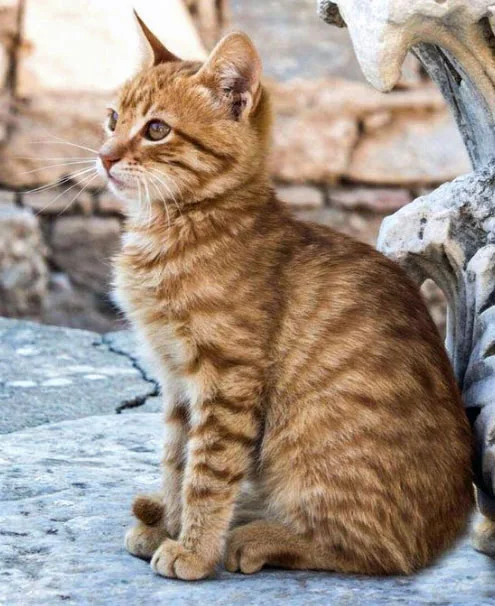This is a question that is sometimes asked. I think you have to apply a bit of common sense. There would seem to be two distinct personality types (a) confident and outgoing and (b) timid, shy and retiring.
 |
| 2 main character types for cats. Image: MikeB |
Cat adopts person
Sometimes people tell us their stories when adopting a cat from a shelter. They say that the cat adopted them. The same applies to dogs.
When a rescue cat at a shelter comes to the potential adopter in any one of many ways, it indicates that they are a little bit more confident than another cat who stays at the back of their cage. The one that holds back is the more reticent retiring one.
You can tell the difference between two different types of cat in terms of confidence levels. This character trait will be with them all their lives. And that's quite important because the degree of confidence compared to the degree of timidity is quite an important factor in how the other aspects of the cat's character develop.
Developing character
For instance, a confident cat is more likely to come forward, interact and to explore and to have new experiences and therefore become more rounded and more able to deal with strange and novel things.
In contrast, the timid cat will enjoy less experiences and even might hide when anything new happens. Both cat types have their advantages in my opinion.
But the point here is that you can tell how a kitten will develop on these broad-brush aspects of character namely confidence and timidity.
Confident cats are more popular
Most people like confident cats because they interact more. But the advantages of a timid cat are often not discussed. One benefit is that because they are more retiring and content to be less active, they are more likely to enjoy the benefits of being full-time inside the home.
They are less likely to want to go out and explore. They are, therefore, less likely to come to harm. And if they are indoor/outdoor cats they are less likely to wander away far and wide if they lack confidence. Getting lost is less of an issue.
Timid is better
I think a domestic cat which is slightly timid is perhaps a better domestic cat companion than a confident one.
The trend nowadays is to keep cats indoors full-time particularly if you live in an urban environment. You don't want to live with a very boisterous active cat under those circumstances.
Bengal cat
Example, the Bengal cat is known to be pretty active, confident and lively. Some people keep them in apartments full-time. I don't think that can work.
In fact, when I lived in an apartment block a friend of mine in a nearby block was the caregiver of an F3 Bengal cat, Daniel. This cat was climbing up the walls to get out.
And when the owner took Daniel out into the gardens for a walk it was impossible to contain him. If he was off the lead he was gone. The point is that apartment living for the confident boisterous outgoing cat might be too challenging.
But apartment living for a timid retiring cat who likes to hide is a good place to be. There is the advantage.
That argument goes against the general consensus that confident cats are better cats.
Young cats killed on roads
And let's remind ourselves that the cats most likely to be killed on the roads are young, immature and confident male cats. They are the ones who like exploring and taking risks.
What I'd choose
I'd argue that the better cat to live with is a slightly retiring, slightly timid, female. That's what I would choose if I was going to adopt a cat right now. Or even better than that you might adopt a disabled cat like a blind cat because you can then keep them indoors full-time without feeling guilty as you've got to keep them indoors.
Character nuances
As to the finer nuances in character, to go back to the original argument, I think you have to wait to when they become adult to find out what they are. Which, by the way, is one reason for adopting an adult cat over a kitten despite the fact that kittens are the most popular type of cat to adopt from a shelter.
If you adopt an adult cat, you know what you're getting, particularly older ones. When you adopt a kitten, you are adopting a cat companion which you don't know that well.
Hector
There is an interesting story on social media about a woman who adopted a male cat called Hector. When he was a kitten, he was sweet and funny but when he grew up "he became a cat that no one could touch, except me. He was easily overstimulated and would attack one's hand while he was being petted."
So, her male cat went from sweet and funny to too difficult to handle. You don't quite know what you're going to get when you adopt a kitten because you will not be able to really predict their adult character except for the broad-brush aspects as mentioned






















